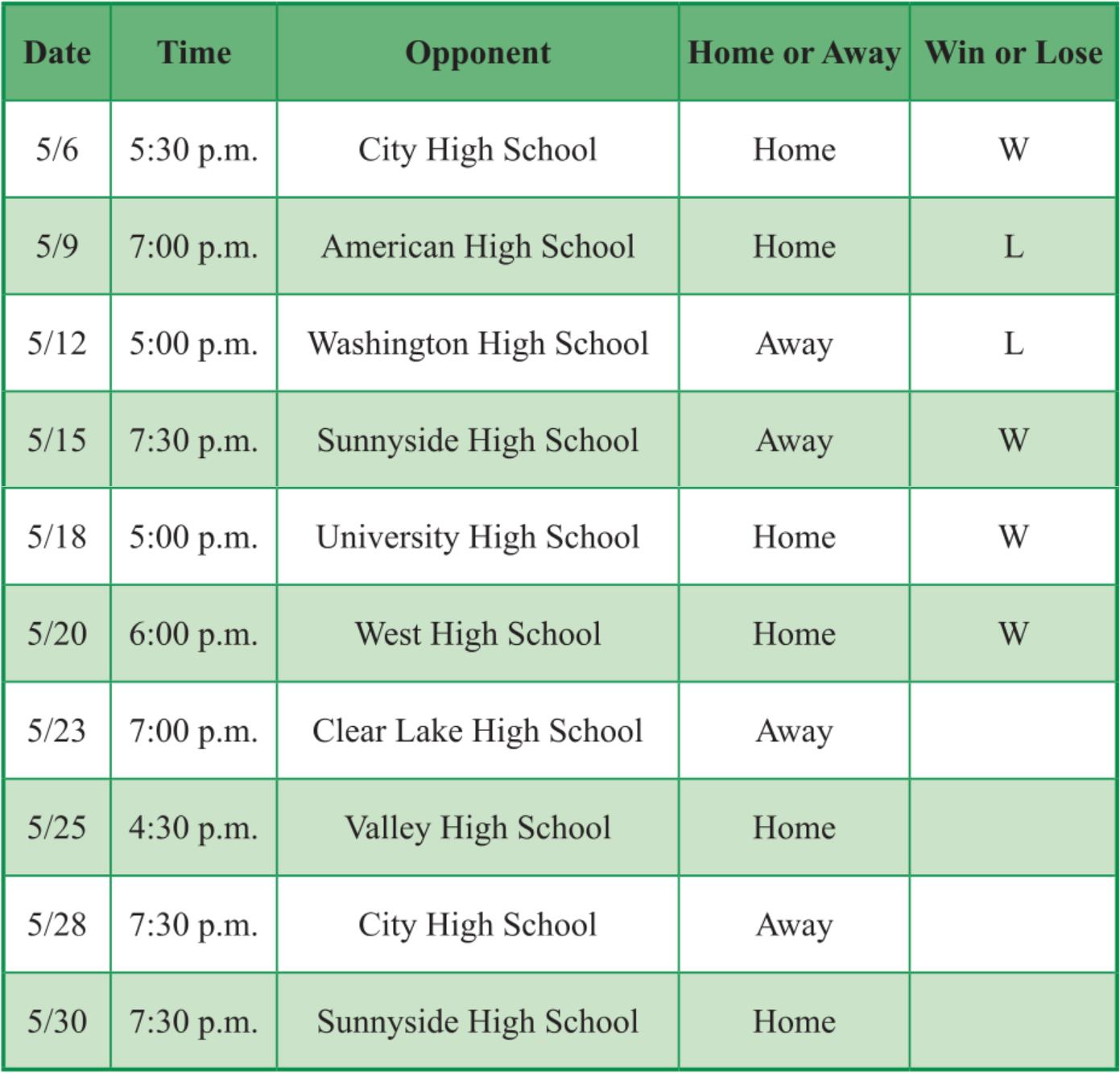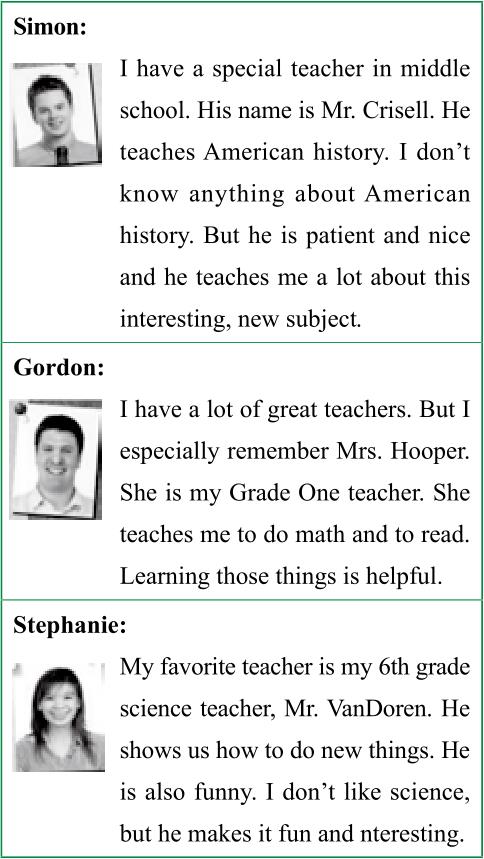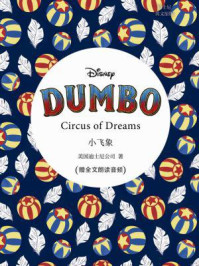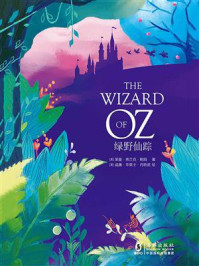





Diego did not like his name. It was a Spanish name, but Diego didn't 1 Spanish. Diego also didn't like it 2 it didn't sound cool. Diego wanted to change his name to something like Brandon or Brock.
Diego told his 3 that he wanted to change his name. His parents were not happy at all. “We 4 you this name. If you change it, you'll be against our wishes,” his mom said. His dad said, “Why don't you just tell people to 5 you something else?” Diego thought if he didn't change his name, people would 6 call him Diego.
But there was nothing else he could do. So Diego tried his parents' suggestion. At school, he told his friends and 7 to call him Brock. His friends laughed at him and 8 him why. His teachers were okay with it, but sometimes they kept calling him Diego. Diego was already 13. It was 9 for people to call him by any other name. They have known him for such a 10 time. They liked to call him Diego.
1. A. tell B. talk C. say D. speak
2. A. because B. if C. when D. how
3. A. classmates B. friends C. parents D. doctors
4. A. showed B. helped C. gave D. bought
5. A. call B. know C. make D. help
6. A. also B. already C. nearly D. still
7. A. brothers B. sisters C. teachers D. students
8. A. answered B. asked C. found D. shouted
9. A. sad B. hard C. easy D. good
10. A. long B. short C. small D. big


1. Mountain High School play with _______ schools.
A. four
B. six
C. eight
D. ten
2. When does Mountain High School play with Valley High School?
A. 5/18.
B. 5/20.
C. 5/23.
D. 5/25.
3. How many matches did Mountain High School win at home?
A. Two.
B. Three.
C. Four.
D. Six.


Dear Ms. Nathan,
Thanks for your vacation pictures! You look great in them! Wow, traveling to Yosemite Park sounds cool. And it's nice that you and Dr. Nathan are doing something different every weekend.
It's great that you are playing the piano well. I like listening to you play. I like playing the piano, too, and I often play it, but I can't play it well.
Morse School really looks great. They are renovating (整修)the old buildings in summer vacation. I think we can see its new look before September, and I think we can move back in then.
My new teacher is Ms. Porter. Many of your former students are in Ms. Porter's class now.
Please write back and tell me about California.
Yours,
Andrea
1. What is true about Ms. Nathan?
A. She wants to visit Yosemite Park.
B. She stays at home every weekend.
C. She usually plays music on weekends.
D. She does something different every week.
2. What is Ms. Nathan good at?
A. Writing letters.
B. Playing the piano.
C. Renovating buildings.
D. Taking pictures.
3. Who is Ms. Nathan?
A. She is Andrea's former teacher.
B. She is Andrea's teacher now.
C. She is Andrea's student.
D. She is Andrea's classmate.

In Taichung, there is a small village of 11 houses called Rainbow Village. In 2010 the village was to be torn down. To save his home, Yung-Fu Huang painted pictures on the walls of his house and other houses. The village became a popular place to visit. And Mr. Huang got a new name: Grandpa Rainbow.
Grandpa Rainbow paints things that make him happy. In the village, you'll see many paintings of cats and other animals. You'll also see paintings of little children. Some of the most popular paintings for visitors are about famous people. Grandpa Rainbow has also painted many pictures of hearts and people in love.
Grandpa Rainbow also painted well-known Chinese sayings. From them, Grandpa Rainbow has learned to live a long and happy life.
1. Why did Grandpa Rainbow start painting houses?
A. Because he wanted a hobby.
B. Because he wanted to be famous.
C. Because he wanted to make money.
D. Because he wanted to save the village.
2. What is true of Rainbow Village?
A. It's a cheap city to live in.
B. It's an interesting place to visit.
C. Many famous people live there.
D. Visitors want to learn about love there.
3. What are the Chinese sayings about?
A. About having a good life.
B. About making money.
C. About being famous.
D. About painting.


In Britain, if you agree to meet friends at three o'clock, they'll be there just when it is three. In Britain, people try to arrive on time. It is impolite to arrive even a few minutes late. If you can't arrive on time, you should call the person you are meeting.
If someone invites you to his birthday dinner at half past seven, you should arrive no later than 7:50. However, if an invitation says “sharp”, you must arrive no later than 7:30.
Never accept an invitation if you don't really plan to go. You may say, “Thank you for inviting me, but I can't come.” After accepting, if you can't go, be sure to tell the inviter that you will try to go but maybe you can't go.
If you want to visit someone, it is polite to give a gift to your host. Flowers, chocolate, or a small gift are all popular. It's good to show your thanks for the host's kindness. You can give a thank-you note or telephone call after the visit.
1. What should you do if you can't arrive on time?
A. Write to the person you are meeting.
B. Call the person you are meeting.
C. Talk with your friend about it.
D. Talk with your parents about it.
2. If someone wants you to arrive at seven sharp, it's good to arrive at __________.
A. 4:30
B. 5:50
C. 7:00
D. 7:10
3. What should you say if you don't want to accept an invitation?
A. I will try to go but maybe I can't go.
B. I really don't want to go.
C. I will get there on time.
D. Thanks, but I can't come.
4. What should you do after the visit?
A. Give small gifts to the host.
B. Give some flowers to the host.
C. Show thanks for the host.
D. Ask the host to visit your house.

请认真阅读下面短文,并根据短文内容回答问题。
Who is your favorite teacher? Teachers are important because great teachers teach us subjects well and help us become better people. So this Teacher's Day, celebrate some of your great teachers. Here, some students talk about their favorite teachers:

1. Why are teachers important?
__________________________________
2. Who doesn't know about American history at first?
__________________________________
3. Why does Simon like Mr. Crisell?
__________________________________
4. What does Mrs. Hooper teach Gordon?
__________________________________
5. How is VanDoren's class?
__________________________________
Spanish adj. 西班牙的 n. 西班牙语
change v. 改变
against prep. 反对
suggestion n. 建议
volleyball n. 排球
schedule n. 进度表;日程表
opponent n. 对手
vacation n. 假期
former adj. 以前的;昔日的
village n. 村庄
tear down 拆除
paint v. 画画
rainbow n. 彩虹
well-known adj. 著名的,出名的
saying n. 谚语
agree v. 同意
impolite adj. 不礼貌的
sharp adv. (……点)整 adj. 锋利的
accept v. 接受
invitation n. 邀请
host n. 主人;东道主
subject n. 科目,学科
celebrate v. 庆祝;赞美
patient adj. 有耐心的
especially adv. 特别
Diego told his parents that he wanted to change his name.
译文 迭戈告诉他的父母,他想改名。
分析 这个句子是主从复合句;Diego told his parents是主句,that引导宾语从句。
And it's nice that you and Dr. Nathan are doing something different every weekend.
译文 你和内桑博士每个周末都做些不同的事情,真好。
分析 这个句子是主从复合句;it's nice是主句,其中it是形式主语,that引导的从句是真正主语。
Grandpa Rainbow paints things that make him happy.
译文 彩虹爷爷画让他开心的东西。
分析 这个句子是主从复合句;Grandpa Rainbow paints things是主句,things是先行词,that make him happy是定语从句,修饰things。
If someone invites you to his birthday dinner at half past seven, you should arrive no later than 7:50.
译文 如果有人邀请你7点半参加他的生日晚宴,你应该不迟于7点50分到达。
分析 这个句子是主从复合句;you should arrive no later than 7:50是主句,no later than意思是“不晚于”;If意思是“如果”,引导条件状语从句;invite sb. to sth.意思是“邀请某人做某事”。
He shows us how to do new things.
译文 他教我们如何做新的事情。
分析 show sb. how to do sth. 是固定结构,意思是“教某人如何做某事”,“how +不定式”充当直接宾语,us为间接宾语。


